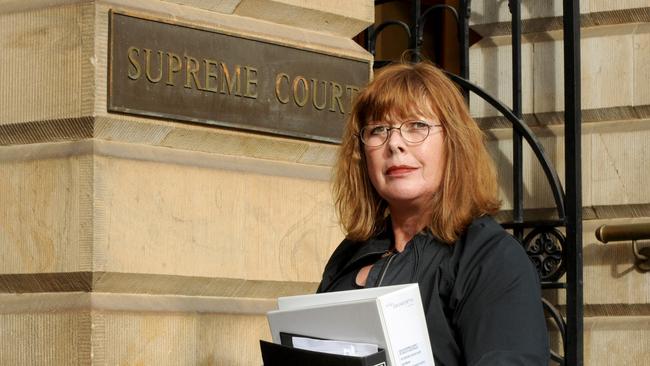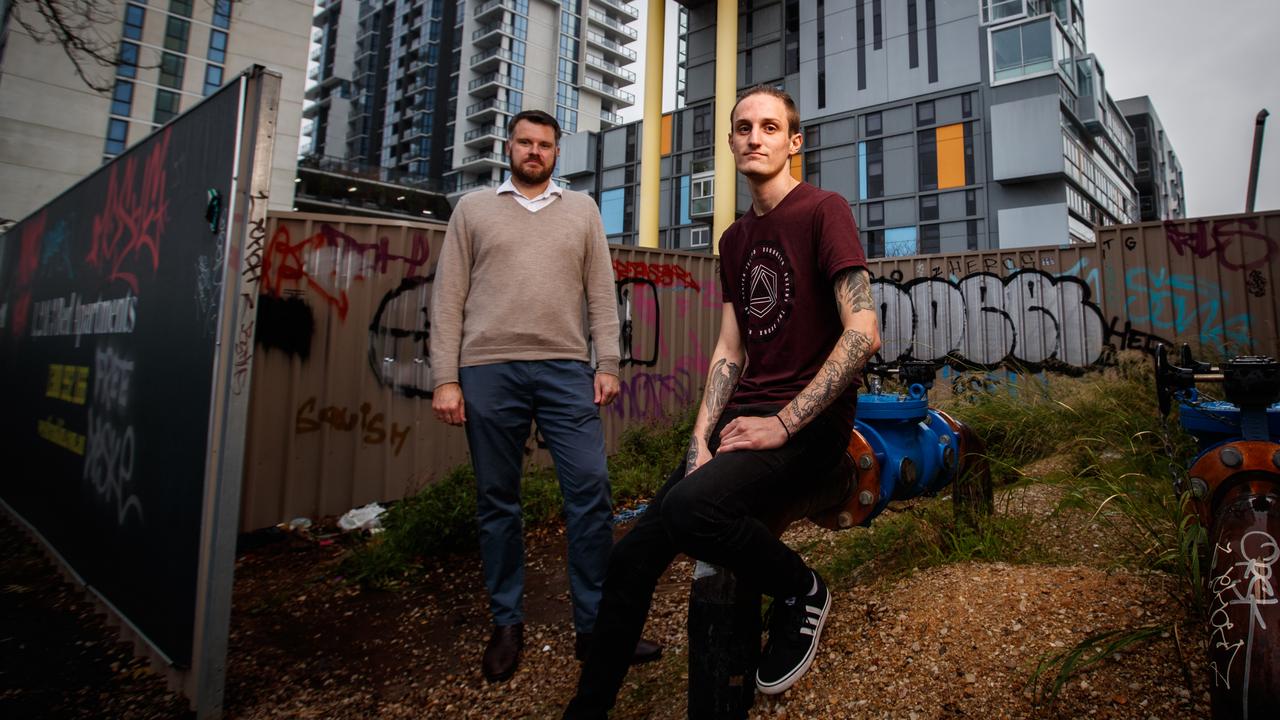Adelaide’s Dr Janice Duffy sued Google and won
Distressed by vile attacks online, an Adelaide woman took on Google, sued them, ran out of money, represented herself – and ultimately won a legal victory that made global headlines. But the story doesn’t end there.

SA Weekend
Don't miss out on the headlines from SA Weekend. Followed categories will be added to My News.
- SA court orders Google pay Dr Janice Duffy $115,000 in damages
- ACCC wants to force Facebook and Google to pay for news
It began innocently enough. Dr Janice Duffy, an Adelaide health researcher, in 2006 visited a website called Kasamba, which offers psychic advice and counselling. In Duffy’s case, she sought guidance about a relationship she was in with a man who lived in the US. Over the course of several consultations, she received only encouragement.
After he broke it off, Duffy complained about the competence of the advice she was given. She also posted comments about her experience on a shaming website called Ripoff Report, where disgruntled people post what they want about anyone they suspect of being criminal or dishonest, or who they just don’t like. She also set up a chat group with other unhappy users of Kasamba and added their complaints to Ripoff Report.
“I, of course, not being a shrinking violet, published some stuff on what we thought was a legitimate complaints website,” says Duffy, 64. “I was the most vocal. I very stupidly revealed my identity in the group so everyone knew who I was.”
Kasamba offers not just psychic guidance but a range of counselling services, and Duffy says at least some of the counsellors were contract workers who did not have to prove their integrity or qualifications before being hosted as practitioners on the site.
“I signed my dog up as an expert in respiratory medicine. I’ve still got the screenshots for Dr Jake,” Duffy says. “He had a profile but he didn’t practise; he had better things to do. But it was a way of showing they were taking anyone. Another one in our group signed up her cat as a teacher.”
In response to the complaints, retaliatory personal abuse about her began appearing on the Ripoff Report, alleging that, among other things, Duffy was a psychic stalker and that she was crazy. These allegations took on many forms, with false claims that she had dyslexia, that she lied, that she was dangerous, a blackmailer and obsessive.
Duffy only became aware of this in relation to an entirely separate public service claim she had in relation to alleged bullying. In the course of the claim, WorkCover found the comments online and tried to use them to undermine her case.
“They found the site and were trying to make out that I was crazy,” she says. “I was ill at the time but I wasn’t crazy. I knew that.”
She began seeing a psychologist and a GP, took a package from her employer and gradually returned to health. In 2009 she was well enough to tackle the problem of getting the defamatory content removed.
It was so entrenched in any search under her name that screenshots from 2010 show Dr Janice Duffy “psychic stalker from the Respiratory Function Unit, Repatriation General Hospital” and Dr Janice Duffy “Stop the Australian Psychic Stalker”.
How do you even go about getting Google to right this kind of wrong? It’s the biggest search engine in the world and is so pervasive it has generated its own verb. Imagine trying to not just contact it, but to ask it to remove content you believed to be unfair and defamatory?
“It took me several months to find out how to get in touch and I actually called Google in the States and got the email address for reception at Google Australia,” she says. “So I sent a removal request to them.”
She was eventually referred to an email address for removals and she asked three times for the defamatory content to be taken down. Each time she was refused, with Google claiming it could not remove a posting from the site without Ripoff Report’s permission.
On investigating this, Duffy discovered it was the site’s commercial practice – there are now warnings about this online – to not remove damaging commentary. Its prominence in the Google rankings gave it enormous clout and Ripoff Report would instead offer to charge people thousands of dollars to rehabilitate their reputation in Google search results and snippets by adding new material saying, for example, the person was making reparations or had mended their ways.
“At the end of 2010 I decided I should see some lawyers, because I thought if Google got a letter from a lawyer, they would take it down and I could just walk away,” she says.
South Australian law firm Johnston Withers filed proceedings on her behalf in February 2011 and the offending links – there were six web pages containing defamatory content and, at the time, up to 200 separate links on Google – were partially removed, but only if the searcher was using Google.com.au and not Google.com.
Duffy says the Ripoff Report website then changed its URL structure so the material was again easily accessed in response to a simple search.
Duffy tried to get an injunction to stop them but failed. Google’s lawyers also tried to get the action thrown out in the SA District Court and they also failed.
Mediations were attempted but with no result and a Supreme Court trial date was set for 2015.
By now Duffy, who was also caring for her sick father, had virtually run out of money. In April that year she had been forced to go to Centrelink for help. Even her superannuation had gone.
Eighteen days before the trial was due to begin, Johnston Withers notified her they could no longer act on her behalf because there was no reasonable prospect they would be paid.
“They couldn’t spare lawyers for a couple of weeks for nothing and I understand that, so I had to take it on myself,” she says.
Duffy turned up at the trial, sick with nerves and stress, with a shopping trolley full of trial books, ready to take on Google’s lawyers, which included a team sent in from Sydney and two Adelaide barristers: Sam Doyle SC, who is now a justice of the SA Supreme Court, and Anna Jackson, now a magistrate. While Doyle and Jackson treated her with compassion and respect, the others did not.
“The Sydney ones were awful; they treated me with contempt and tried to make me out as mad or crazy, that the whole thing was all about this romantic attachment,” she says.
The trial was gruelling and Duffy thinks now that she should have called as witnesses others from the support group, which would have at least deflected the attention away from her. She was not experienced enough to know she could do that.
“This could have shown it wasn’t a case of me having my revenge because the psychics were wrong; it was a more complex issue involving people who were being ripped off, who were going there for counselling, mostly people with depression,” she says.
The nine-day trial started in June 2015 and in August there were two days of closing arguments, in which Doyle spoke for a full day and most of the next, before she summed up.
And she won. In October, the court found that Google had defamed Duffy because of the way the company’s famous patented algorithm worked, which was to elevate the defamatory claims on the Ripoff Report website high up in a search. It was found to be a publisher of the defamatory material and lost all claim to being an innocent disseminator after Duffy had brought it to Google’s attention.
The court rejected Google’s claim that it was like a librarian who just presents the material for people to use on the internet, and not a publisher. The court also considered whether a defence of truth was available but found no evidence that Duffy had ever stalked psychics.
Defamation barrister Paul Heywood-Smith took up Duffy’s case and argued for damages. In December 2015 Duffy walked out with $100,000 plus $15,000, and total vindication.
“I wish it hadn’t happened but I beat the bastards,” she said at the time. “Google can’t come into our country, destroy reputations and get away with it.”
It was also an enormous relief for Duffy because, had the initial finding gone against her, she would have been liable for Google’s court costs, which were running then at about $2 million. Google then appealed to the Full Court of South Australia, which rebuffed Google’s argument that it was not a publisher.
“They lost that,” Heywood-Smith says. “They are a publisher and in Australia at least they are exposed. They didn’t take this to the High Court so they have, in effect, acknowledged that they are bound by it. In the event the decision sets a global precedent.”
At which point the whole saga should have been over. Duffy had succeeded but didn’t feel successful. Once lawyers’ fees were paid she had little money left and she says she was still being harassed on various websites. Overall, she was exhausted and wanted her pre-Google life back.
“I think at that stage I realised it wasn’t going to be back to the way it was before all of this,” she says. “There was no way that I could repair all the damage done to me, to my reputation or my ability to work. I had hoped that it wouldn’t go to trial, that it would be resolved quietly, but Google refused to make it go away.”

In an act of open defiance repeated before and since to other complainants around Australia, Google did not take the defamatory material down. It was still there, available for anyone to see, through to the end of 2018 and after its appeal had failed. By continuing to publish after the trial, it became a new publication of the defamation.
So Duffy sued again. “When it became clear again that they weren’t going to remove it, they were going to ‘deep pocket’ me again, the case went on back before Justice Malcolm Blue,” she says.
Google’s argument, which it uses to shore up its position as the untouchable tech behemoth, is that it operates under US law, not Australian, and is not ultimately bound by something a court in Adelaide says. Google maintains this separate jurisdiction, even though material can be accessed in Australia from the US.
“They say ‘we do not have to; we are under US law’, so it’s not just about me anymore,” Duffy says. “They are saying ‘we comply with everything; we really want to help people’ but if you ask Google’s lawyers to remove something defamatory, they won’t.”
At the end of 2018 Duffy says Google took manual steps to downgrade Ripoff Report’s ranking. Duffy’s wasn’t the only Ripoff Report case that Google was getting court orders against and a decision was made to downgrade the website, which stripped it of its power. She could have walked away but Duffy wanted Google to be made accountable for leaving the material up after it was found to be defamatory.
“It’s the principle,” she says. “I mean, my life has changed irrevocably; it will never go back. But if I don’t fight this, Google can do this to everyone – stick up their fingers to the court. They say ‘fine, sue us’ and that’s the problem, because so few people have the resources to see them through the legal process. They just don’t have the money.”
In 2018 the High Court in Australia made a finding that encouraged legal action against Google. In this case, Melbourne music promoter Milorad Trkulja was shot in the back in 2004 by an unidentified gunman. He argued that he was wrongly connected online with a series of underworld killings that linked his name with that of Melbourne crime boss Tony Mokbel. The imputation was that he was a gangland figure but Trkulja argued he had only ever seen Mokbel on television or in news reports, and the only underworld figure with whom he had any contact was Mick Gatto, whose hand he shook after being introduced in a chance meeting after lunch in Lygon St.
Trkulja sued Google in 2012 and won but links to underworld figures continued through auto-complete predictions that popped up while searching his name. He won initially and was awarded $200,000. When he attempted to sue Google again, it went to the High Court, which in 2018 delivered a judgment in his favour, saying he could pursue a case against Google on the basis of auto-predicted defamation.
In another case, in Queensland, a Brisbane businessman whose character was attacked on Ripoff Report won a defamation case but then sued Google because the material had not been permanently taken down.
And last June the NSW Supreme Court issued a contempt charge against Google for ignoring a separate court ruling to remove snippets linking to damning reviews of a Sydney businessman, posted by online trolls or industry rivals, that effectively ruined his reputation. His lawyer told the court that Google totally ignored the order. “It was unbelievable,” the lawyer said. “It was just a wall of silence from Google and more and more horrible posts went online.”
Outside of the court case Duffy has sent about 100 emails directly to Professor John Hennessy, the former president of Stanford University and chair of the board of Alphabet, Google’s parent company. They were emotional pleas to him about the damage being done to her and others by Google, with repeated requests for Google to stop.
“I live with the public shame of the defamation from Ripoffreport.com every day and I am not sure I can go on. Every part of me is broken,” she wrote to him in 2015. “You are the chair of the Google board and you need to do something to stop the use of the company’s power to destroy people’s lives.”
A year later Duffy wrote that she had won in law and on the evidence.
“It is such a shame that Google have become such monsters,” she wrote. “But I have already set a global common law precedent against Google, by myself, against all the legal muscle that a few hundred billion dollars can buy.”
Interestingly, she could see that her emails were read, but Hennessy never responded.
Duffy is once again preparing to defend herself in the SA Supreme Court, with a trial likely next year. Justice Blue had ruled there was sufficient time between the earlier judgment and later publications of the defamation to warrant a second trial, and he has referred it to a Master of the Supreme Court, Judge Graham Dart, a common practice with a self-represented litigant.
Heywood-Smith is admiring of the way Duffy has conducted herself in court, and says from all accounts she has done a first-class job.
“She has a PhD, she is smart, she had some direction at the start but she had to run it essentially by herself,” he says. “She received a good hearing from the trial judge, who was mindful of the need to protect the private litigant against an entity like Google.”
This time, Duffy is asking that Google acknowledge its failure to remove the defamation and she is seeking the permanent removal of the material – not just an undertaking that would leave open the potential for the posts to return.
And she wants compensation for hurt feelings and loss of potential income. “The first thing that prospective employers do is a Google search, and they would have seen the defamatory content,” she says.
Asked if she regrets ever getting into a fight with Google, Duffy says it depends on which day you ask her.
“I wish it hadn’t worked out this way but it has,” she says. “I can’t change what’s happened but it’s changed me in ways that have taken a lot of time to get over. It has taken 10 years and I’ve been through a lot.”
There is one upside. Google “Dr Janice Duffy” now and instead of psychic stalker you get the woman who sued Google, and won.
Her case has been picked up around the world and it is the subject of legal articles and university courses. Her name is now permanently attached to the global legal precedent that changed the way Google can be held accountable and it has already been used against the company in courtrooms in Australia.
“Janice is a real figure in the law of defamation in Australia as a result of this case, no question about it,” Heywood-Smith says.
On that score, Duffy is very happy she stuck with it, despite the heavy personal cost.
“I wish it hadn’t happened but I’m glad I didn’t back down to them,” she says.
“It feels like I spend my whole life fighting this but I am not going to give up. Google has to be brought to account.”


